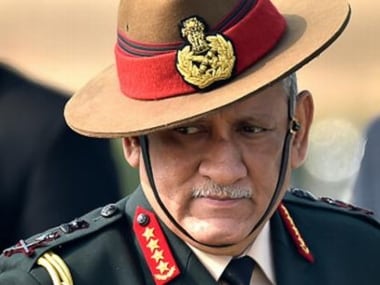It’s becoming increasingly difficult to distinguish between the services and the diplomats these days.
Army chief General Bipin Rawat’s lecture at the General KV Krishna Rao memorial lecture was delivered with his usual aplomb and style. The chief is a great speaker, but parts of the lecture seemed to be rather inappropriate for someone of his stature. At one point, he was quoted as saying that “Russians are very keen on associating with the Indian Army because we are very capable. We are capable of standing for what is right for us based on our strategic thought process”. That in itself is an inexplicable statement.

The Indian Army’s thought process may be brilliant, but it still has to go through the political strategy decided by the powers that be. The decisions to buy or not buy further weapons systems from Russia — for instance, the Kamov helicopters or the space-based weaponry to which he referred also lies with the government of the day. Pointing out that these further buys are being favoured by the army is hardly likely to help a government that has negotiated the S-400 deal and is maneuvering diplomatically to avoid sanctions threatened under Countering America’s Adversaries through Sanctions Act (CAATSA).
The reverse can be said about the air force chief Air Chief Marshal BS Dhanoa’s able defence of the Rafale deal, wherein he brought out the threat and the rather desperate existing capability of the force. The chief’s statement was dignified, factual and did not go a step beyond what is expected of him as a service head. What is unfortunate is that he had to go on record at all. The PowerPoint slideshow by Air Marshal SBP Sinha of Central Command should have been more than enough. He was an intrinsic part of the team that negotiated the deal — including the price — and his word could hardly be questioned.
Further, Dhanoa is not one to make off-the-cuff statements. Therefore, his defence of not just the Rafale, but the S-400 while not required, unfortunately coupled the two arms deals. Social media is already wondering why the chief came into the picture at all. Meanwhile, Opposition parties will be waiting to sniff out a wedge in the air defence deal too, with a little help from their friends.
Service chiefs have traditionally stayed well away from the media glare, barring commemorative occasions like Army Day etc. There’s a reason for that. It shields them from the arrant nonsense spouted by political parties, particularly when they’re in Opposition. The fact that Congress president Rahul Gandhi’s statements have varied wildly even on the alleged price escalation of the Rafale is just one example. Other Opposition parties in their time have also done the same, though more effectively and with more credibility.
The scandal over the Bofors artillery guns — which incidentally broke the back of the Pakistanis at Kargil — led to deal-after-deal being scuppered by diffident bureaucrats and politicians alike. For instance, AK Anthony — who was once called the “worst defence minister ever” — was famed for his ability to sidestep actually signing on to anything, unless it was made into a “Teflon deal”. As a result, the already lackadaisical bureaucracy in the Ministry of Defence took even longer to pass pending requests for equipment. It took 30 years for instance, for the army to get its deal for new M-777 howitzers.
The Indian Air Force brought out its Request for Proposal (RFP) for the Medium Multirole fighters in 2007 and has since been pleading its case for new fighters for decades, arguing that its fighter strength is well below (31) its very basic requirement of 42. It’s hardly surprising that the services are getting desperate. The threat is increasing while politicians squabble. This has to stop. But it has to be stopped by the politicians themselves. Service chiefs should not be seen as propagating or defending acquisitions from any country. They are the last repositories of trust of the public. We simply can’t afford to lose that. There’s far more at stake than a few aircraft.
